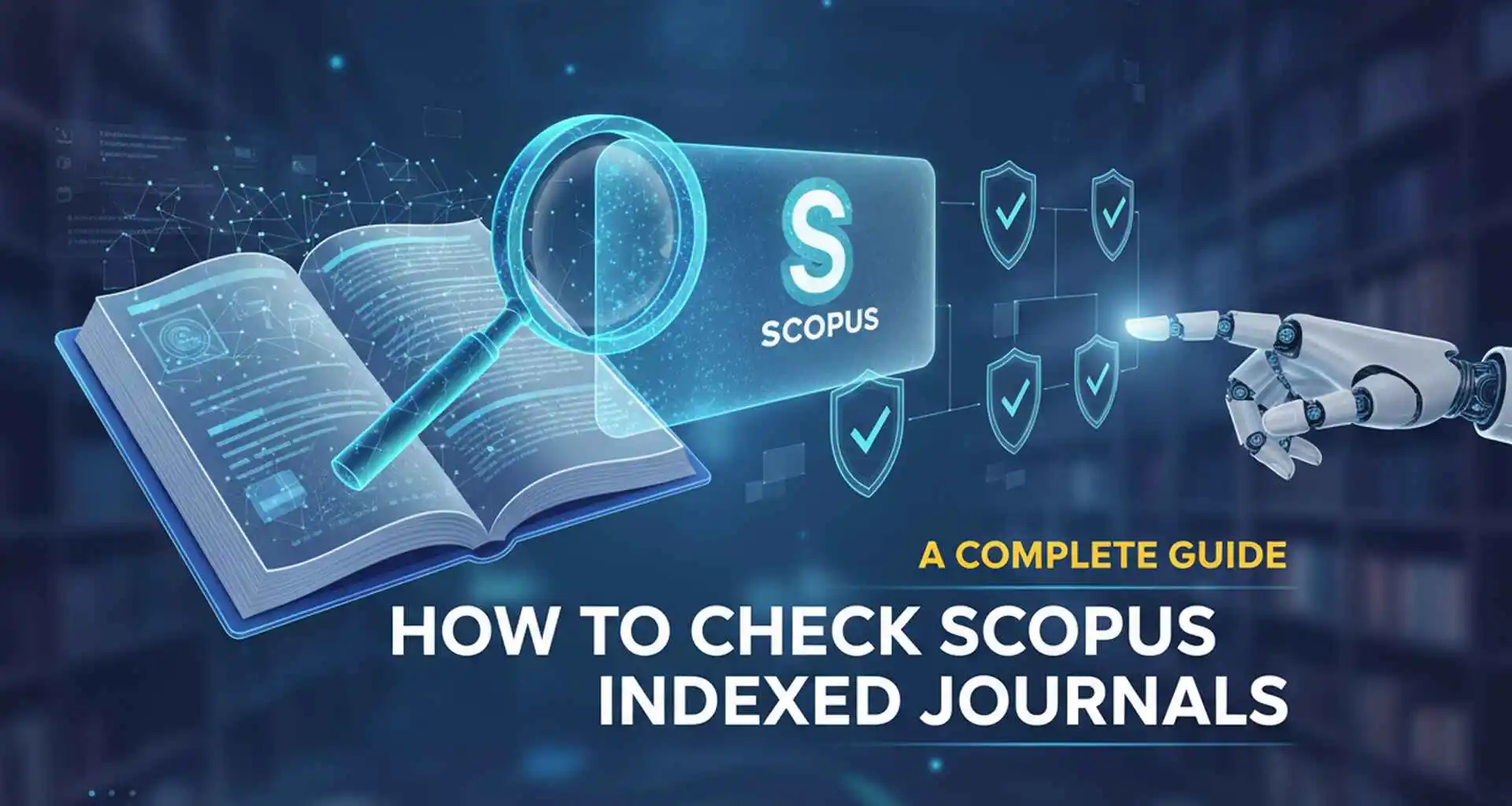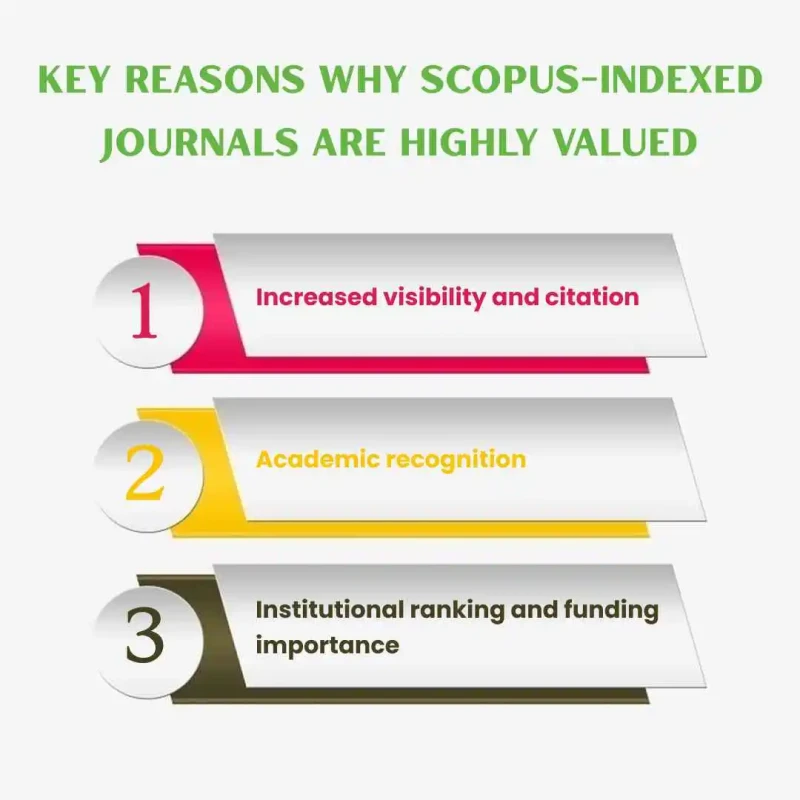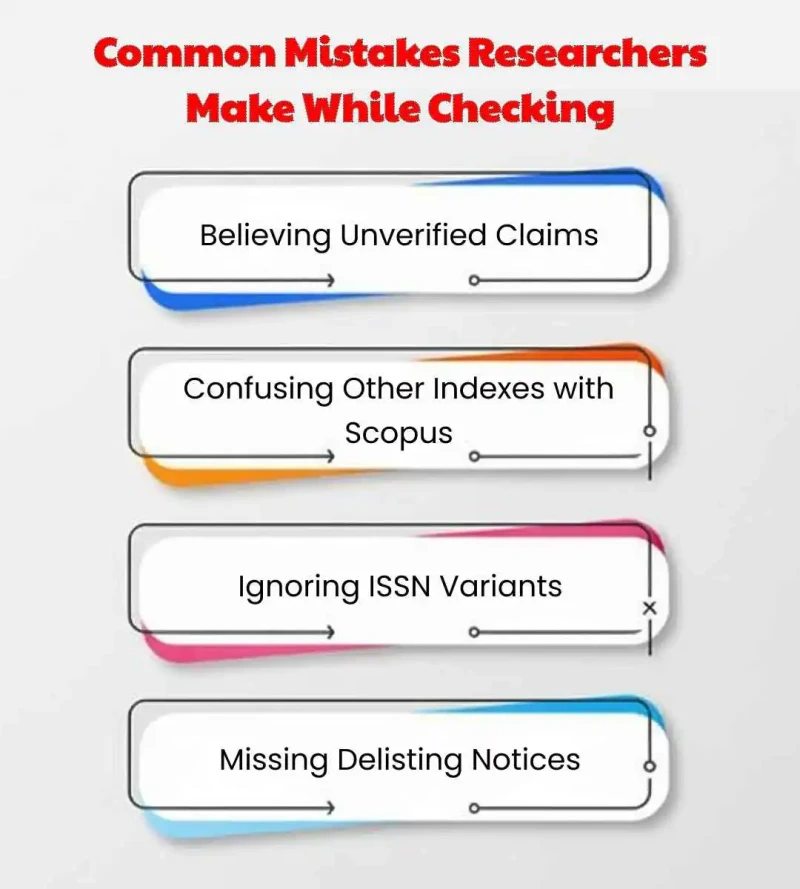
Emilia
Identifying whether a journal is genuinely Scopus-indexed can be confusing, especially with so many misleading claims online. This guide walks you through how to check Scopus indexed journals step by step, helping you separate legitimate publications from predatory ones.
You’ll also learn how to verify a journal’s authenticity, track updates, and protect your research from being wasted on fake outlets
Scopus, owned by Elsevier, isn’t just another database — it’s a huge collection of research from across the world. It lists over 27,000 active journals from more than 7,000 publishers, covering everything from medicine and engineering to social sciences and the arts.
Getting indexed in Scopus isn’t easy. Each journal goes through strict checks for quality, ethics, and consistency. If it makes the cut, that’s a big deal. For researchers, it’s like having their work recognized on a global stage — proof that their findings are credible and worth reading.

Your work becomes easier to access when it is published in Scopus indexed journals, hence exposing your work worldwide. That is the same as increased citation and wider effect.
Employers, sponsors, and universities alike favor (and sometimes demand) publishing in Scopus indexed journals. It is an assurance that your work is of international quality.
Most national and international university rankings — including QS and Times Higher Education also heavily depend on Scopus metrics.
That means that the papers you publish directly influence your institution's performance indicators, fundable prospects, and reputation.
A journal is strictly screened by the Content Selection and Advisory Board (CSAB) prior to accepting it to Scopus. The screening is done to ensure that only authentic and relevant publications survive.
Journal Quality Standards
Scopus seeks many categories such as publication ethics, editorial policies, consistency, diversity in authors, and article relevance. Journals that fail these standards never get a chance.
Peer Review & Policies
All journals will undergo open and transparent peer review. Low or suspect peer-review journals will typically fall short or be purged from the database entirely.
Impact & Relevance
Scopus also looks at the journal's citation and scholarly output history over the long term. Journals that go out of date or fail quality testing are de-listed.
Scopus browses through all journals on a continuous basis. If a journal is found to be cheating by fake practice, fake peer review, or improper citation strategies, it can be shut down. This is why one check will not need to be checked each time you publish.
The internet is littered with "too good to be true" journals purporting to be Scopus indexed but are not. They'll tempt you with quick publication and low fees. Such publications rarely gain visibility and can harm your academic reputation.
A paper in a delisted or non-indexed journal will not be available in academic databases, thus becoming less readable for other researchers or cited by them as well. Academic invisibility is that for serious researchers.
It is a policy of most universities that PhD articles or publication for promotion should be in Scopus indexed journals. Publication in other places may lead to delay, rejection, or cut-off.
Go to the Scopus official page: https://www.scopus.com/sources.
Click on the "Sources" search box.
Search by journal name, ISSN, or publisher.
If it shows up, it's indexed. Click on the title to view coverage years, subject category, and metrics like CiteScore or SJR.
If it doesn't show up, it's not indexed or has been delisted.
You can check Scopus Preview— an open search facility where you can search for any journal's indexing by title or ISSN. This is useful if you are not institutionally subscribed.
Most university libraries ought to have complete subscriptions of Scopus. Librarians can also confirm if a journal is indexed and even provide you with official documents. Double-check always through your institutional research office.
Elsevier's Journal Finder helps you locate proper journals in your area of study — and even recommends so in the case that they are Scopus indexed. You can even paste and copy in your abstract for your paper to get the optimal matches.
To ensure legitimacy, perform a scopus journal search with the journal title or ISSN to confirm it’s officially listed, with active coverage, subject categories, and publisher details.
If you have a publication, then check your Scopus author profile. Any of the journals listed there are Scopus indexed. This double checks both your publication and if the journal exists.
If you are still unsure, use these backup sources:
ISSN Portal: Checks official registration of journals.
DOAJ (Directory of Open Access Journals): Checks existence of open-access journals.
University Research Support Offices: Give current Scopus indexing status and notifications regarding predatory journals.
Selection of the proper Scopus indexed journal is not merely taking a name from a list. It involves thoughtful consideration to make your research public to the intended audience and receive proper acknowledgment. Here is a pragmatic guide on how to check Scopus indexed journals
Ensure the journal has articles in your own field of study. A mismatch can result in desk rejection regardless of the journal's rank.
These metrics indicate how influential, visible, and quality the journal is. Higher values tend to indicate greater readership and more citation power.
Others are very selective and may take months before publishing. Knowing these factors helps organize your research dissemination schedule economically.
Check peer-review procedures, editorial board reputation, and fee transparency. Publishing journals that compromise may discredit your academic standing.

It may say "Scopus indexed" on the website of a journal, but do not rest assured it is indexed. Always cross-check from reliable sources.
All "indexed" journals are not necessarily Scopus indexed. Web of Science or Google Scholar indexing ≠ Scopus inclusion.
Some journals have ISSNs for print and online edition which are distinct — search twice for each.
Journals may be former indexes that were delisted because of poor performance. Always check your current status.
Scopus journal listings change regularly. To stay current, check the official Scopus Sources List, subscribe to alerts, or follow trusted publishers. Staying updated ensures your research targets reputable journals and avoids delisted or misleading publications.
Scopus refreshes its list of discontinued journals regularly. It can be downloaded off the Scopus Sources page in the "Discontinued Titles" category.
Subscribe to Scopus or Elsevier sites for alerts. Journals will be notified to you when added, delisted, or status changed.
Different research centers and librarians provide monthly report-outs of journal status changes. Keep yourself updated so that you do not end up publishing in delisted or suspect journals.
Most researchers seek professional publication advisors or agencies since verifying a journal's Scopus indexing is not always easy. Journals will state that they are indexed but are delisted, predatory, or misrepresented. Experts assist by:
Confirming the official Scopus status of the journal using ISSN, title, and publisher data.
Determining delisted or low-quality journals that might damage your reputation.
Directing researchers to appropriate scope, ethical, and visibility metric journals.
In brief, professional guidance saves time, prevents risky journals, and gets your work published in a genuine, well-known Scopus indexed journal, protecting both your research impact as well as your career.
Publishing in a Scopus-indexed journal isn’t just a box to tick, it’s a mark of credibility, quality, and global recognition. Every researcher should know how to check whether a journal is truly indexed, verify ISSNs, rely on credible sources, and stay cautious of delistings or duplicate journals.
Checking Scopus indexing protects your research and ensures it reaches the right audience. Use the official Scopus Sources List, Elsevier tools, or expert guidance. With proper care, you can safely publish your work in reputable journals that enhance both your career and the wider academic community.

Machine Learning Research Paper: How to Design, Write, and Publish Cutting-Edge ML Research

How to Write an IEEE Paper for Conferences: What Reviewers Expect

Importance of Literature Review in Research – Complete Guide for Scholars

How to Write a Synopsis for a Thesis: A Complete Writing Framework

Top 5 Best Literature Review Writing Service for PhD Scholars